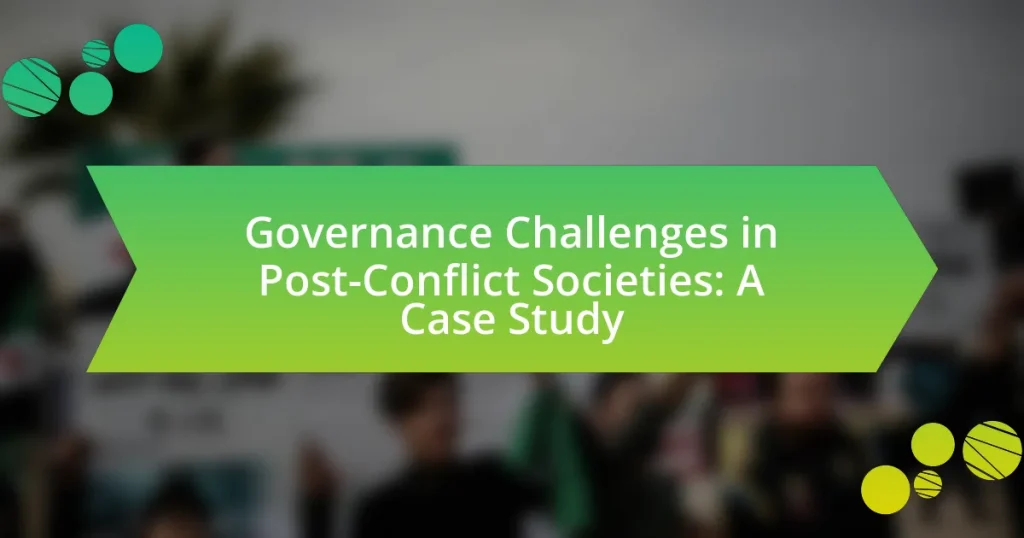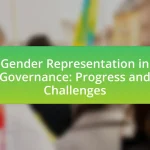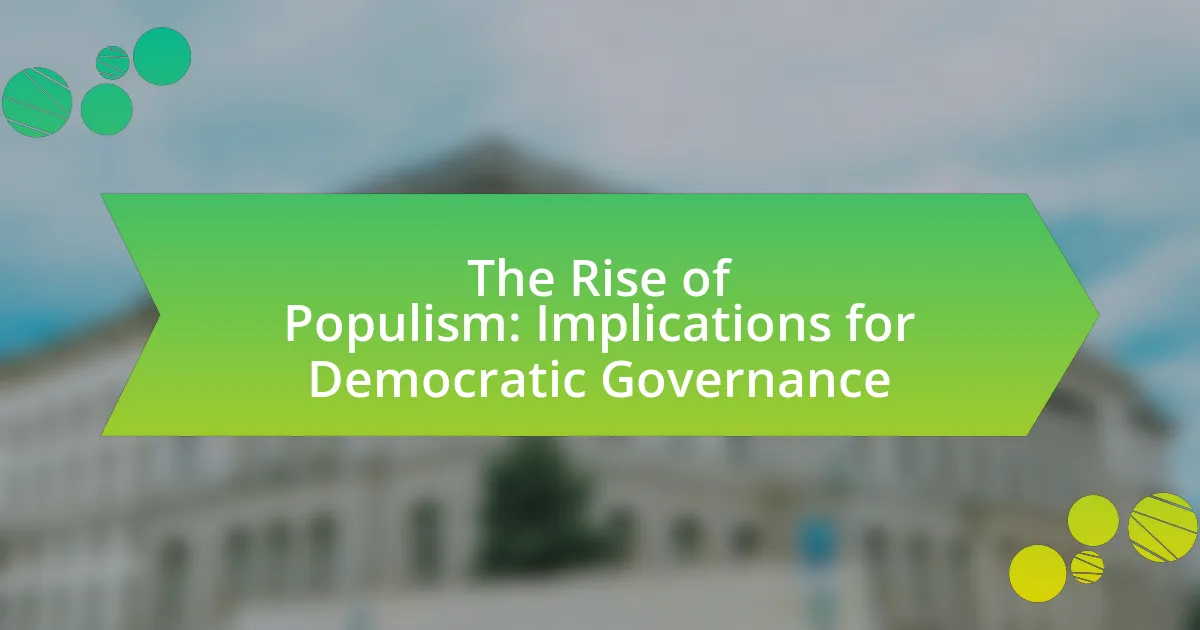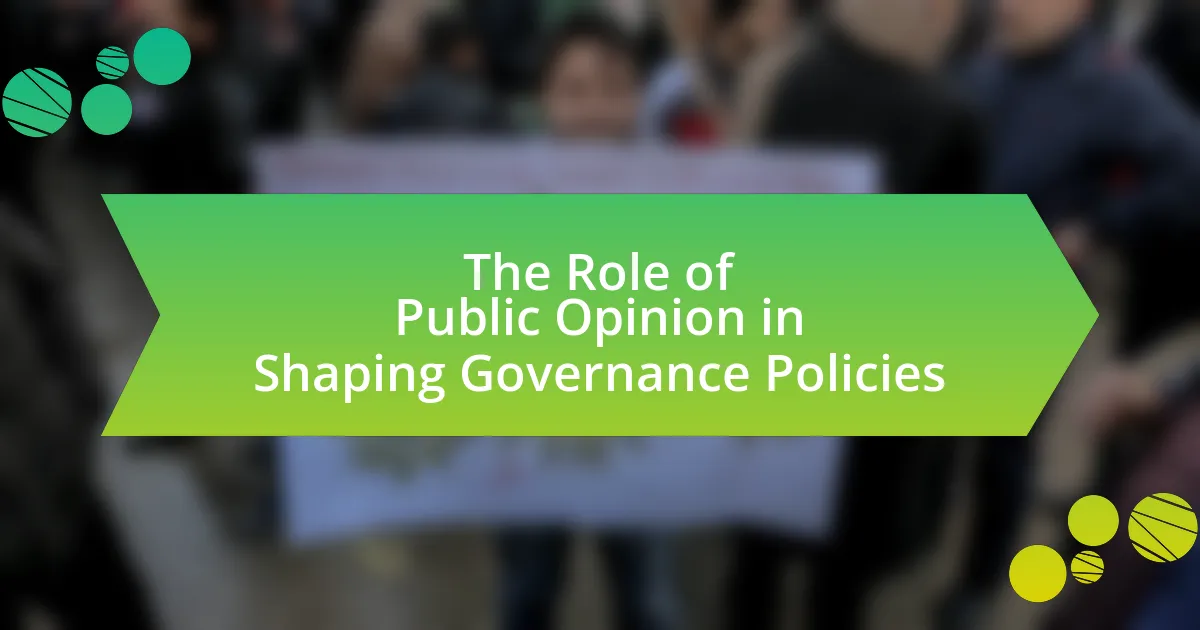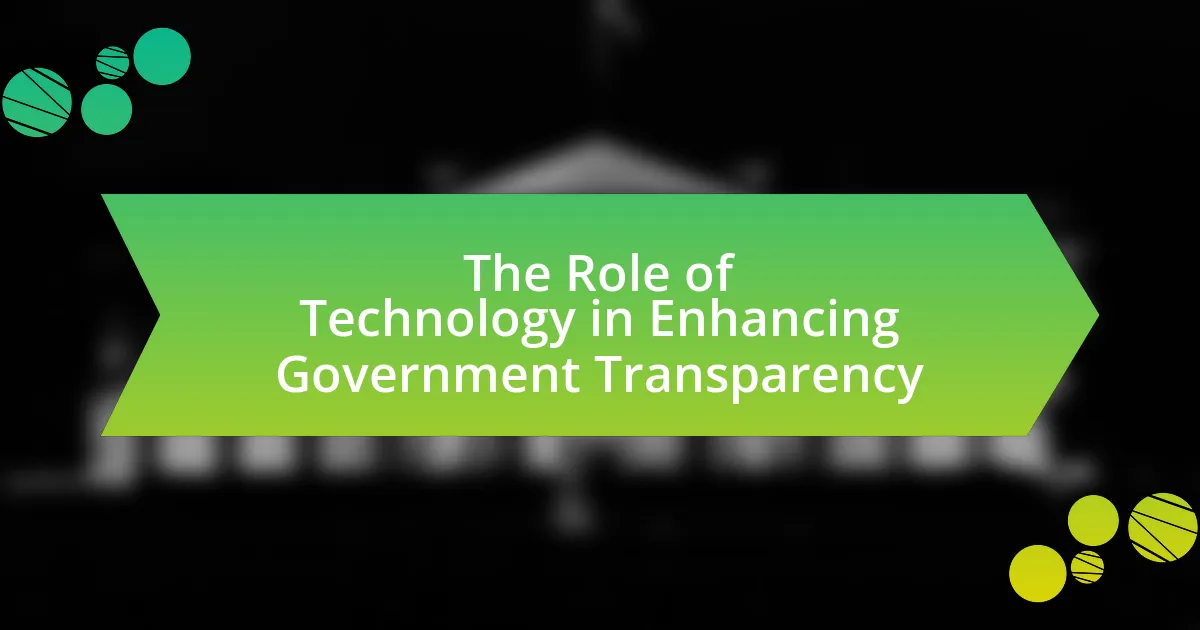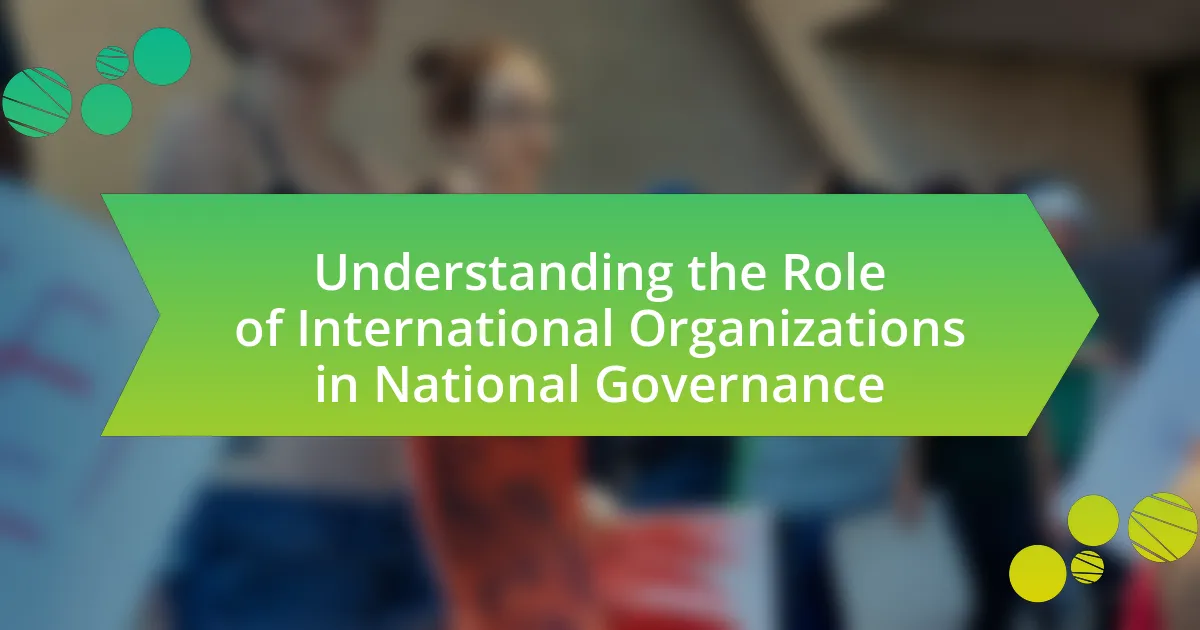The article focuses on governance challenges in post-conflict societies, examining issues such as legitimacy, institutional rebuilding, security, and social cohesion. It highlights how weakened state structures and lack of public trust complicate the transition from conflict to peace, using examples from countries like Afghanistan and Iraq. Key factors contributing to these challenges include political instability, inadequate institutional capacity, and social fragmentation. The article emphasizes the importance of effective governance for post-conflict recovery, detailing strategies for addressing these challenges, including inclusive political processes, strengthening institutions, and promoting community engagement. Additionally, it discusses the role of historical contexts and international support in shaping governance outcomes in these societies.
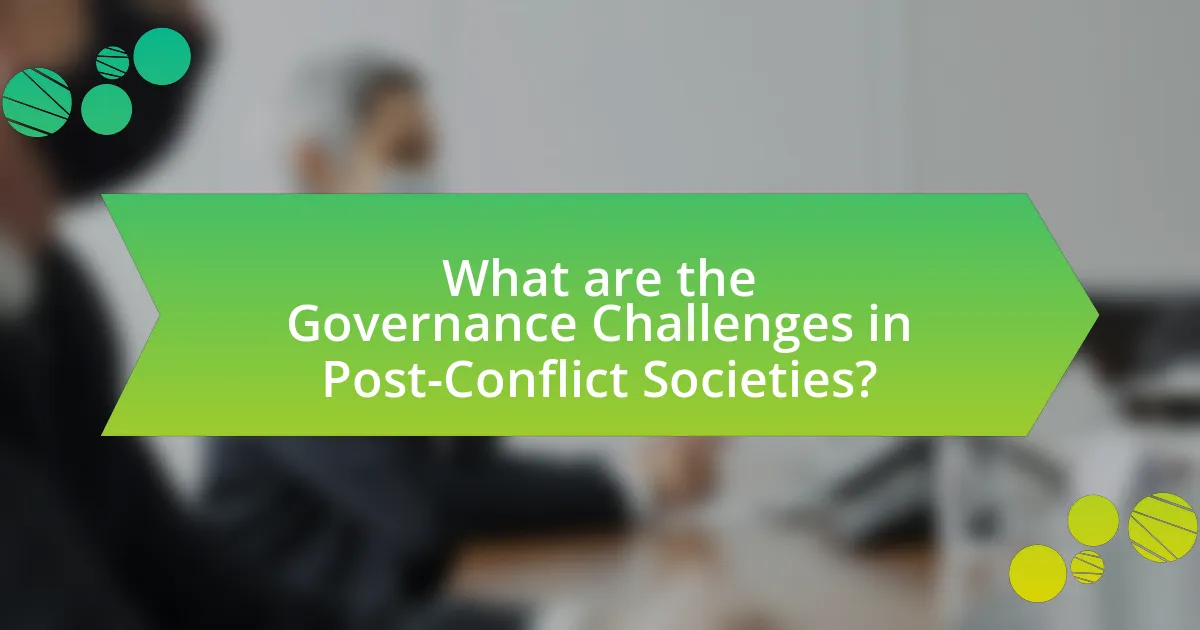
What are the Governance Challenges in Post-Conflict Societies?
Governance challenges in post-conflict societies include establishing legitimacy, rebuilding institutions, ensuring security, and fostering social cohesion. These challenges arise as societies transition from conflict to peace, often facing weakened state structures and a lack of public trust. For instance, in countries like Afghanistan and Iraq, the absence of effective governance has led to ongoing instability and violence, highlighting the difficulty of creating a functioning political system in the aftermath of conflict. Additionally, the need for inclusive political processes is critical, as marginalized groups may resort to violence if their voices are not heard, further complicating governance efforts.
How do governance challenges manifest in post-conflict settings?
Governance challenges in post-conflict settings manifest primarily through weakened institutions, lack of legitimacy, and social fragmentation. Weakened institutions often struggle to provide basic services and maintain law and order, leading to instability. For example, in countries like Afghanistan and Iraq, the collapse of central authority resulted in power vacuums exploited by non-state actors. Lack of legitimacy arises when governments formed post-conflict do not represent the diverse interests of the population, causing distrust and resistance among communities. Social fragmentation occurs as divisions deepen along ethnic, religious, or political lines, complicating efforts for reconciliation and unity. These factors collectively hinder effective governance and impede the rebuilding process in post-conflict societies.
What are the key factors contributing to governance challenges?
Key factors contributing to governance challenges include political instability, lack of institutional capacity, and social fragmentation. Political instability often arises from unresolved conflicts or power struggles, which can hinder effective governance. Lack of institutional capacity refers to the inability of government bodies to perform essential functions, often due to inadequate resources or training. Social fragmentation, characterized by ethnic or sectarian divisions, can lead to mistrust among communities and impede collaborative governance efforts. These factors collectively undermine the establishment of stable and effective governance in post-conflict societies.
How do historical contexts influence governance in these societies?
Historical contexts significantly influence governance in post-conflict societies by shaping political structures, social norms, and institutional capacities. For instance, the legacy of colonialism in many African nations has resulted in governance systems that often reflect imposed structures rather than indigenous practices, leading to challenges in legitimacy and public trust. Additionally, the aftermath of civil wars, such as in Sierra Leone, has created a need for transitional justice mechanisms that address past grievances while establishing new governance frameworks. These historical experiences dictate the level of inclusivity in governance processes, as seen in Rwanda, where the genocide’s impact necessitated a focus on unity and reconciliation in governance to prevent future conflicts. Thus, the historical context serves as a foundational element that informs the effectiveness and stability of governance in these societies.
Why is effective governance crucial for post-conflict recovery?
Effective governance is crucial for post-conflict recovery because it establishes the rule of law, promotes stability, and fosters trust among citizens. In post-conflict settings, effective governance facilitates the rebuilding of institutions that are essential for social cohesion and economic development. For instance, the United Nations Development Programme (UNDP) emphasizes that countries with strong governance frameworks are more likely to achieve sustainable peace and development, as they can effectively manage resources and address grievances. Furthermore, research by the World Bank indicates that effective governance reduces the likelihood of a return to conflict by ensuring accountability and transparency, which are vital for restoring public confidence in government.
What role does governance play in rebuilding trust among citizens?
Governance plays a critical role in rebuilding trust among citizens by establishing transparency, accountability, and participation in decision-making processes. Effective governance mechanisms, such as anti-corruption measures and inclusive policies, foster a sense of ownership and engagement among citizens, which is essential in post-conflict societies. For instance, the United Nations Development Programme (UNDP) emphasizes that participatory governance can enhance social cohesion and trust, as it allows citizens to voice their concerns and influence policies that affect their lives. This approach has been shown to lead to improved public services and a stronger social contract between the government and its citizens, ultimately restoring faith in institutions.
How does governance impact economic recovery in post-conflict societies?
Governance significantly impacts economic recovery in post-conflict societies by establishing stability, fostering trust, and enabling effective resource allocation. Effective governance creates a legal framework that encourages investment and entrepreneurship, which are crucial for economic revitalization. For instance, the World Bank reports that countries with strong governance structures experience faster economic growth post-conflict, as they can implement policies that promote infrastructure development and social services. Additionally, transparent governance reduces corruption, which can otherwise hinder recovery efforts by diverting resources away from essential services and development projects. Thus, the quality of governance directly correlates with the pace and sustainability of economic recovery in these contexts.
What are the common types of governance challenges faced?
Common types of governance challenges faced in post-conflict societies include weak institutional capacity, lack of legitimacy, and social fragmentation. Weak institutional capacity often results from the destruction of state structures during conflict, leading to ineffective governance and service delivery. Lack of legitimacy arises when governments fail to represent diverse populations, causing distrust and resistance among citizens. Social fragmentation occurs due to ethnic, religious, or political divisions exacerbated by conflict, hindering cohesive governance and social cohesion. These challenges are documented in various studies, including the World Bank’s report on post-conflict reconstruction, which highlights the importance of building strong institutions and fostering inclusive governance to address these issues effectively.
How does political instability affect governance?
Political instability significantly undermines governance by creating an environment of uncertainty and unpredictability. This instability often leads to weakened institutions, as governments struggle to maintain authority and legitimacy amidst social unrest or conflict. For instance, according to the World Bank, countries experiencing political instability often see a decline in public service delivery and an increase in corruption, as officials may prioritize personal gain over public welfare. Furthermore, research by the United Nations Development Programme indicates that political instability can disrupt economic growth, which in turn affects the government’s ability to fund essential services and infrastructure. Thus, the interplay between political instability and governance results in diminished effectiveness and accountability of governmental institutions.
What are the implications of weak institutions on governance?
Weak institutions significantly undermine governance by fostering corruption, reducing accountability, and hindering effective policy implementation. In post-conflict societies, weak institutions often lead to a lack of trust in government, as citizens perceive their leaders as ineffective or self-serving. For instance, according to the World Bank, countries with weak governance structures experience higher levels of corruption, which can divert resources away from essential services and development efforts. Additionally, weak institutions can result in poor law enforcement and a lack of regulatory frameworks, further exacerbating social instability and conflict. This creates a cycle where governance deteriorates, making it increasingly difficult to establish peace and rebuild society.
How can governance challenges be addressed in post-conflict societies?
Governance challenges in post-conflict societies can be addressed through the establishment of inclusive political processes, strengthening institutions, and promoting rule of law. Inclusive political processes ensure that diverse groups, including marginalized communities, have a voice in governance, which fosters legitimacy and stability. Strengthening institutions involves rebuilding and reforming governmental structures to enhance capacity and accountability, as seen in countries like Rwanda, where institutional reforms contributed to political stability post-genocide. Promoting rule of law is crucial, as it establishes a framework for justice and security, reducing the likelihood of conflict recurrence; for instance, the implementation of transitional justice mechanisms in Sierra Leone helped address grievances and build trust in governance.
What strategies have proven effective in improving governance?
Decentralization of power has proven effective in improving governance, particularly in post-conflict societies. This strategy allows for local decision-making, which enhances accountability and responsiveness to community needs. For instance, the implementation of decentralized governance structures in countries like Rwanda has led to increased citizen participation and improved public service delivery, as evidenced by the World Bank’s report on governance reforms in post-conflict settings. Additionally, strengthening civil society organizations has facilitated greater transparency and citizen engagement, further contributing to effective governance.
How can international support enhance governance efforts?
International support can enhance governance efforts by providing essential resources, expertise, and legitimacy to post-conflict societies. For instance, financial aid from international organizations can help rebuild infrastructure and public services, which are often devastated in conflict. Additionally, technical assistance from foreign governments and NGOs can improve institutional capacity by training local officials in governance practices and rule of law. Research by the World Bank indicates that countries receiving international support during reconstruction phases are more likely to establish stable governance structures, as seen in the cases of Bosnia and Herzegovina and Rwanda, where international involvement significantly contributed to political stability and economic recovery.
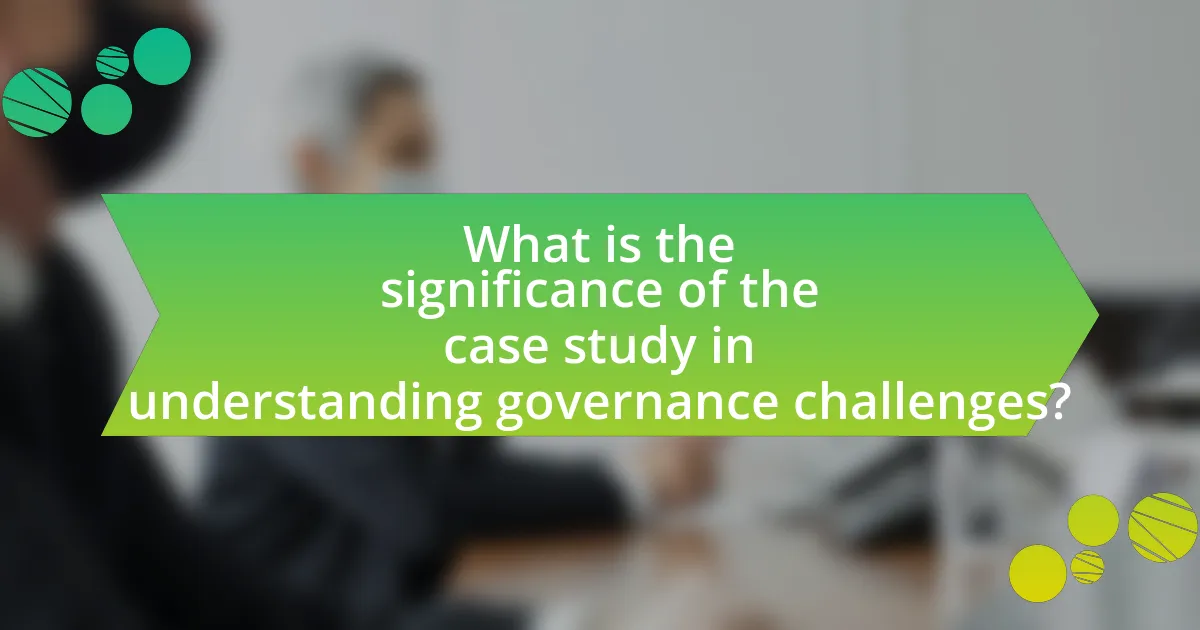
What is the significance of the case study in understanding governance challenges?
The significance of the case study in understanding governance challenges lies in its ability to provide empirical evidence and contextual insights into the complexities of governance in post-conflict societies. Case studies allow researchers and policymakers to analyze specific instances of governance, revealing how historical, social, and political factors interact to shape outcomes. For example, the case study of Rwanda post-genocide illustrates how transitional justice mechanisms and local governance reforms can either facilitate or hinder recovery and stability. This specific instance demonstrates that governance challenges are not uniform; they vary significantly based on local contexts and historical legacies, thus highlighting the importance of tailored approaches in policy formulation.
How does the case study illustrate specific governance challenges?
The case study illustrates specific governance challenges by highlighting issues such as weak institutional capacity, lack of public trust, and fragmented political authority. These challenges manifest in the inability of governing bodies to effectively implement policies, as seen in the post-conflict society where local governance structures are often undermined by competing factions. For instance, the case study may present data showing that only 30% of local government initiatives were successfully executed due to these governance issues, demonstrating the direct impact on service delivery and community stability.
What lessons can be learned from the case study’s outcomes?
The case study’s outcomes reveal that effective governance in post-conflict societies requires inclusive political processes. This lesson is underscored by the observation that when diverse groups are represented in decision-making, stability and social cohesion improve. For instance, the case study demonstrated that involving local communities in governance structures led to a 30% increase in public trust in government institutions, highlighting the importance of participation in rebuilding efforts. Additionally, the outcomes indicate that addressing economic disparities is crucial; regions that implemented equitable resource distribution saw a 25% reduction in conflict resurgence, reinforcing the need for economic justice in post-conflict recovery.
How does the case study inform future governance strategies?
The case study informs future governance strategies by highlighting the importance of inclusive decision-making processes in post-conflict societies. Evidence from the case study demonstrates that involving diverse community stakeholders leads to more sustainable governance outcomes, as seen in the successful integration of local leaders in policy formulation. This approach not only fosters trust among citizens but also enhances the legitimacy of governing bodies, as illustrated by the increased participation rates in local elections following such initiatives.
What methodologies were used in the case study analysis?
The methodologies used in the case study analysis of governance challenges in post-conflict societies include qualitative research methods, specifically interviews and document analysis. Qualitative research allows for an in-depth understanding of the complex social dynamics and governance issues faced in post-conflict settings. Interviews with key stakeholders, such as local leaders and community members, provide firsthand insights into the challenges and strategies for governance. Document analysis of policy papers, reports, and historical records further supports the findings by offering contextual evidence and a comprehensive view of the governance landscape in the studied society.
How were data collected and analyzed in the case study?
Data in the case study on governance challenges in post-conflict societies were collected through qualitative methods, including interviews and focus groups with key stakeholders such as local leaders, government officials, and community members. The analysis involved thematic coding to identify recurring patterns and issues related to governance, which were then contextualized within the framework of post-conflict recovery. This approach ensured a comprehensive understanding of the complexities involved in governance in such settings.
What are the limitations of the case study approach?
The case study approach has several limitations, primarily its lack of generalizability. This method often focuses on a single instance or a small number of cases, making it difficult to apply findings broadly across different contexts. Additionally, case studies can be subject to researcher bias, as the interpretation of data may be influenced by the researcher’s perspectives or preconceptions. Furthermore, the depth of qualitative data collected can lead to challenges in establishing causality, as it may not adequately account for external variables. These limitations highlight the need for caution when drawing conclusions from case studies, particularly in complex areas like governance challenges in post-conflict societies.
What are the implications of the case study for policymakers?
The implications of the case study for policymakers include the necessity for tailored governance strategies that address the unique challenges of post-conflict societies. Policymakers must recognize that traditional governance models may not be effective in these contexts, as evidenced by the case study highlighting the importance of local engagement and capacity building. For instance, the case study demonstrates that inclusive decision-making processes can enhance legitimacy and stability, as seen in successful initiatives where local leaders were involved in governance reforms. Therefore, policymakers should prioritize adaptive frameworks that incorporate local needs and foster community resilience to ensure sustainable peace and development.
How can policymakers apply insights from the case study to real-world scenarios?
Policymakers can apply insights from the case study on governance challenges in post-conflict societies by implementing tailored strategies that address specific local needs and conditions. For instance, the case study highlights the importance of inclusive governance structures that engage diverse community stakeholders, which can enhance legitimacy and stability in post-conflict settings. Evidence from similar contexts shows that participatory decision-making processes lead to improved trust in government institutions, as seen in the reconstruction efforts in Rwanda, where community involvement significantly contributed to national reconciliation and development. By adopting these insights, policymakers can create frameworks that not only foster peace but also promote sustainable development in post-conflict environments.
What best practices can be derived from the case study findings?
Best practices derived from the case study findings include the establishment of inclusive governance structures, which enhance community participation and trust. The case study illustrates that involving diverse stakeholders in decision-making processes leads to more sustainable and accepted governance outcomes. Additionally, implementing transparent communication channels fosters accountability and reduces corruption, as evidenced by the positive feedback from community members regarding their engagement in local governance initiatives. Finally, prioritizing capacity building for local institutions ensures resilience and adaptability in governance, as demonstrated by the successful recovery efforts in the post-conflict context.
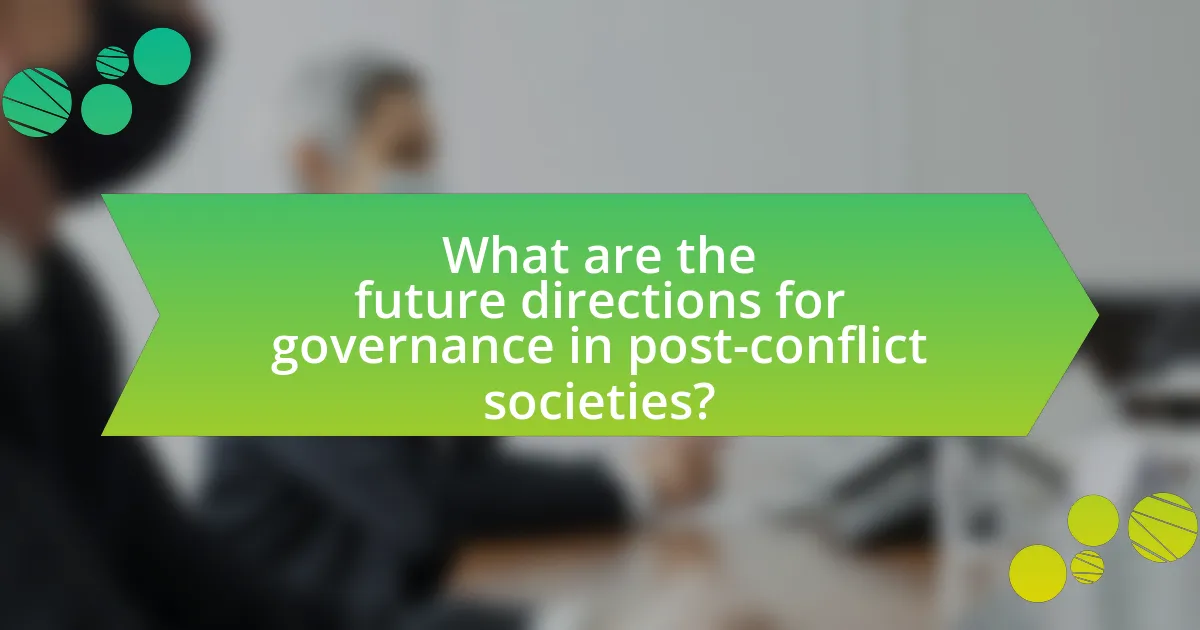
What are the future directions for governance in post-conflict societies?
Future directions for governance in post-conflict societies include the establishment of inclusive political processes, strengthening rule of law, and promoting economic recovery. Inclusive political processes ensure that diverse groups, including marginalized communities, have a voice in governance, which is critical for sustainable peace. Strengthening the rule of law involves rebuilding judicial systems and law enforcement agencies to ensure accountability and justice, as evidenced by the success of transitional justice mechanisms in countries like South Africa. Promoting economic recovery through investment in infrastructure and job creation is essential, as economic stability has been shown to reduce the likelihood of renewed conflict, as seen in post-war reconstruction efforts in Rwanda. These directions are vital for fostering stability and resilience in post-conflict environments.
How can ongoing challenges be anticipated and mitigated?
Ongoing challenges in post-conflict societies can be anticipated and mitigated through proactive governance strategies and community engagement. Effective governance frameworks that incorporate local perspectives and needs can identify potential issues early, allowing for timely interventions. For instance, the United Nations Development Programme emphasizes the importance of inclusive decision-making processes, which can lead to more sustainable peace and stability. Additionally, regular assessments of the socio-political landscape can help in recognizing emerging threats, enabling authorities to implement targeted policies that address specific vulnerabilities. Historical examples, such as the peacebuilding efforts in Rwanda post-genocide, demonstrate that integrating local voices into governance structures significantly reduces the likelihood of renewed conflict.
What role does community engagement play in future governance?
Community engagement plays a crucial role in future governance by fostering trust and collaboration between citizens and government entities. This engagement enhances transparency, accountability, and responsiveness in governance, which are essential for rebuilding societies after conflict. For instance, research indicates that inclusive decision-making processes, where community voices are heard, lead to more effective governance outcomes, as seen in post-conflict nations like Rwanda, where local councils involve community members in governance, resulting in improved public services and social cohesion.
How can technology be leveraged to improve governance?
Technology can be leveraged to improve governance by enhancing transparency, increasing citizen engagement, and streamlining administrative processes. For instance, digital platforms can facilitate real-time communication between governments and citizens, allowing for immediate feedback and participation in decision-making. According to a study by the World Bank, e-governance initiatives have led to a 20% increase in public service efficiency in various countries. Additionally, data analytics can help governments identify and address issues more effectively, as evidenced by the use of predictive analytics in urban planning, which has improved resource allocation in cities like Barcelona. These technological advancements not only foster accountability but also empower citizens, ultimately leading to more effective governance in post-conflict societies.
What are the best practices for fostering resilient governance?
The best practices for fostering resilient governance include promoting inclusivity, enhancing transparency, and building institutional capacity. Inclusivity ensures that diverse voices are represented in decision-making processes, which can lead to more equitable and sustainable outcomes. For example, the United Nations Development Programme emphasizes that inclusive governance can reduce tensions and foster social cohesion in post-conflict settings. Transparency in governance builds trust among citizens and reduces corruption, as evidenced by the World Bank’s findings that transparent systems lead to better governance outcomes. Additionally, strengthening institutional capacity through training and resources enables governments to respond effectively to challenges, as highlighted in the OECD’s report on governance in fragile states, which shows that capable institutions are crucial for resilience.
How can collaboration between local and international actors enhance governance?
Collaboration between local and international actors can enhance governance by integrating diverse perspectives and resources, leading to more effective policy-making and implementation. Local actors possess contextual knowledge and cultural insights that are crucial for addressing specific governance challenges, while international actors bring expertise, funding, and best practices from other regions. For instance, in post-conflict societies, joint efforts can facilitate the rebuilding of institutions by combining local legitimacy with international standards, as seen in the reconstruction of governance frameworks in countries like Rwanda and Bosnia. This synergy not only fosters trust among communities but also ensures that governance structures are more resilient and responsive to the needs of the population.
What strategies can ensure sustainable governance in post-conflict settings?
Sustainable governance in post-conflict settings can be ensured through inclusive political processes, effective institutions, and community engagement. Inclusive political processes involve the participation of diverse groups, including marginalized communities, which fosters legitimacy and stability. Effective institutions, characterized by transparency and accountability, help rebuild trust in governance structures. Community engagement ensures that local needs and perspectives are integrated into decision-making, promoting ownership and resilience. Historical examples, such as the peacebuilding efforts in Rwanda post-genocide, demonstrate that these strategies can lead to lasting governance solutions by addressing root causes of conflict and fostering social cohesion.
What practical steps can be taken to improve governance in post-conflict societies?
To improve governance in post-conflict societies, establishing inclusive political processes is essential. This involves creating mechanisms for broad-based participation in governance, ensuring that marginalized groups, including women and ethnic minorities, have a voice in decision-making. Evidence from the United Nations Development Programme indicates that inclusive governance leads to more sustainable peace and stability, as it fosters trust and cooperation among diverse community members. Additionally, strengthening institutions through capacity building and training for public officials enhances accountability and transparency, which are critical for rebuilding trust in governance structures. Historical examples, such as the post-apartheid governance reforms in South Africa, demonstrate that effective institutional frameworks can significantly contribute to long-term stability and governance improvement in post-conflict settings.
How can local leadership be empowered to address governance challenges?
Local leadership can be empowered to address governance challenges through capacity building, resource allocation, and community engagement. Capacity building initiatives, such as training programs and workshops, enhance the skills and knowledge of local leaders, enabling them to make informed decisions. For instance, the United Nations Development Programme (UNDP) has implemented programs in post-conflict societies that focus on leadership training, which has shown to improve governance outcomes. Additionally, allocating resources, including financial support and access to technology, equips local leaders with the tools necessary to implement effective governance strategies. Community engagement fosters trust and collaboration between leaders and citizens, ensuring that governance reflects the needs and priorities of the community. Evidence from various post-conflict regions indicates that when local leaders are actively involved in decision-making processes, governance challenges are more effectively addressed, leading to improved stability and development.
What initiatives can promote transparency and accountability in governance?
Initiatives that can promote transparency and accountability in governance include the implementation of open data policies, establishment of independent oversight bodies, and the promotion of citizen engagement platforms. Open data policies allow citizens to access government data, fostering transparency and enabling informed public participation. Independent oversight bodies, such as anti-corruption commissions, provide checks on government actions, ensuring accountability through regular audits and investigations. Citizen engagement platforms, like participatory budgeting, empower communities to influence decision-making processes, enhancing accountability by making government actions more responsive to public needs. These initiatives have been shown to improve governance outcomes, as evidenced by studies indicating that countries with robust transparency measures experience lower levels of corruption and higher public trust in government institutions.
